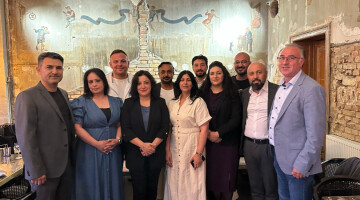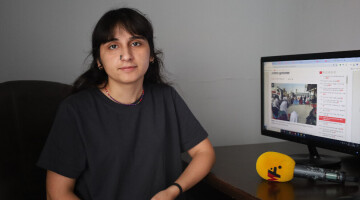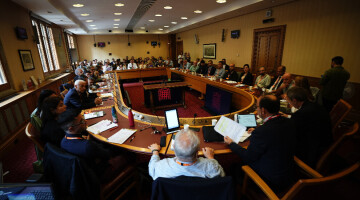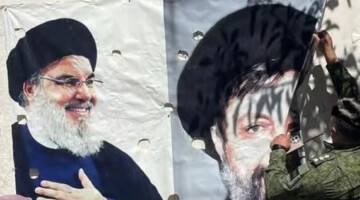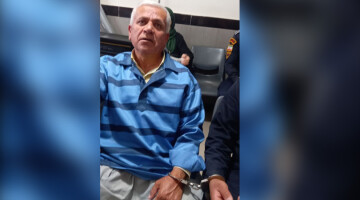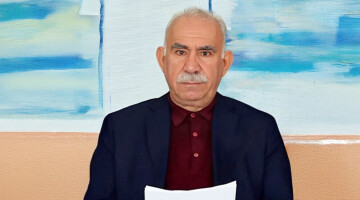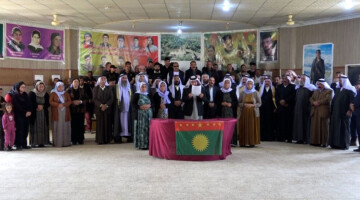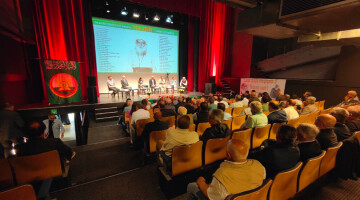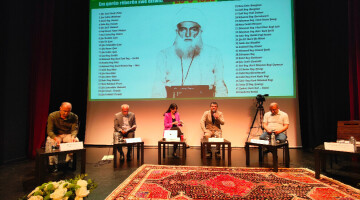Conditions in detention centres in Turkey are becoming increasingly dramatic. For sick prisoners, these conditions are deadly. In recent months, the political treatment of sick prisoners has taken on a planned dimension and led to at least seven deaths. A new law on execution also blocks the release of prisoners who have served their sentences and show no remorse. The political campaign of extermination against the Kurds is currently also concentrated in the prisons.
Since mid-November, members of political prisoners have been carrying out a "justice vigil" in the premises of the Bar Association of Amed (tr. Diyarbakir). The aim of the initiative is to cause an outcry within the public and to move the entire civil society to act on behalf of the political prisoners - also in the west of the country. Concerned for the lives of their imprisoned relatives, people are demanding that legal standards be respected.
One of these activists is Hasine Güler. Her husband Sidik has been in prison for 26 years, her son Habip for 18 years. Both have serious health problems, Hasine Güler demands the suspension of the sentence. Yakup, another son, died in the guerrilla war and was buried in an unknown place.
Arrest during morning prayer
Hasine Güler tells the following about her husband's arrest: "When the security forces entered our house, my husband was at morning prayers. He was arrested for an incident he had nothing to do with. Although he did nothing, he has been in prison for 26 years. After his arrest, it was very difficult for us as a family. Once he was released, he was imprisoned again after his conviction became final. He was first in Diyarbakir prison, then he was transferred to Aydin and from there to other places. Most recently, he was taken to Iskenderun prison. My husband has had three heart operations and an operation on his eye. He was even taken to the doctor in handcuffs. He got infected with Corona and was quarantined for three to four months."
Son with the guerrillas
Hasine Güler's son Habip was a guerrilla and was arrested 18 years ago in Hasankeyf. He has been in prison ever since. He has health problems in his eyes and legs, his mother says: "As a family we do what we can, but it is not enough. We have been going to the prison for 26 years. For us, every day is a new death, we can't sleep at night. When my husband was arrested, they also took two of my daughters. They knocked out my teeth. We had already been expelled from our village. We were forced to live with insufficient means in the city. No one gave us a place to live. Economically, we were doing very badly. And as if that was not enough, my husband and son were also taken from me."
Did not recognise own son
"When my son was taken, I didn't recognise him, we hadn't seen each other for 15 years before," Hasine Güler says: "When he was still in Diyarbakir, I could visit him. However, he has been in Kandira for three years. Because I am sick and can't make long trips, I can't see him anymore. This is very hard for me."
Fallen son buried in unknown place
Yakup, another son, died as a guerrilla fighter in the Kurdish liberation struggle. "Many years after he left, the news came that he had fallen in Kulp. Along with twenty others, he fell into a trap. They were poisoned in a house and handed over to the state. As if the poisoning was not enough, they were also riddled with bullets. Three of the bodies were thrown from a helicopter. Two were collaborators anyway, they too were taken away. The bodies of the remaining 15 lay in the compound for seven months. The people from the village demanded that they be taken away. As a result, the state buried them somewhere, but we don't know where. Our hearts have suffered a lot and are still burning. Nevertheless, we want peace and equality," says Hasine Güler.

